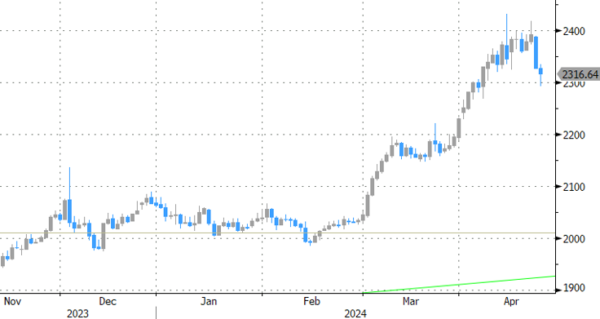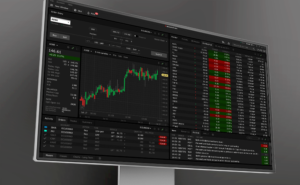Markets
EMU PMI’s confirmed the economy is gradually leaving contraction/stagnation territory that reigned in in the second half of last year and during the first months of 2024. The composite output index rose from 50.3 in March to 51.4 in April, the second consecutive reading >50 after 9 months in contraction territory and the best level since May last year. The rise in de headline index still hides divergent sector performances. Activity in the services sector accelerated to a 52.9 from 51.5 and the manufacturing index declined further from 46.1 to 45.6 but with a moderation in the downturn. Job growth accelerated and business confidence remained elevated by recent standards. With respect to inflation, price pressures picked up across the eurozone, often linked to higher wages. Input costs and selling prices also rose at faster rates, reflecting stubborn price pressures in the service sector. Regarding individual countries, Germany returned to growth (composite PMI 50.5) for the first time in 10 months. France stranded at 49.9. EMU bond markets initially reacted in a guarded way, but yields later in de session gradually turned north again. EMU swap yields added between 1.5 bps (2-y) and 2.5 bps (10-y). US yields also added between 1.5 (2-y) and 4 bps (30-y) going into the publication of the US PMI’s. Gilts underperform with yields rising up to 8 bps (5-y). The April composite PMI also improved more than expected (54.0 from 52.8). However, the rise in UK yields mostly occurred this afternoon as BoE chief economist Pill kept a balanced approach of the timing of BoE rate cuts (MPC remains focused on inflation, erring to the side of caution on rate cuts). Equities perform well (Eurostoxx 50 +1.0%, S&P 500 + 0.3%). On FX markets, EUR/USD briefly tested the 1.0695 resistance (previous YtD low) after the release of the first EMU PMI’s. However, gains initially were difficult to maintain. USD/JPY was blocked in an extremely tight range just below the 155 big figure as Japanese officials including Fin Min Suzuki stepped up verbal interventions. Sterling gained modest ground on the a strong PMI and higher yields. Even so, EUR/GBP still holds above the 0.86 barrier (0.861).
At the moment of concluding this report, US April composite PMI surprisingly dropped from 52.1 to 50.9 with both manufacturing (49.9 from 51.9) and services (50.9 from 51.7) contributing to the decline. Yields (US and EMU) return earlier gains. The dollar makes a step backward too, with EUR/USD revisiting the 1.0695 area.
News & Views
The UK’s Debt Management Office beefed up its debt issuance plans for the 2024-2025 fiscal year by £12.4bn. Total issuance is forecast to be £277.7bn, the second-largest on record. The announcement followed the release of the Office for National Statistics of the 2023-2024 budget deficit which showed a bigger than earlier forecasted shortfall of £120.7bn or 4.4% of GDP. The Office for Budget Responsibility last month estimated a deficit for FY 23-24 of £114.1bn (4.2% of GDP) with lower receipt from income tax and national insurance contributions explaining for most of the gap. The additional borrowing requirement will be met mostly by increased short-dated (+£5.4bn) and medium-term gilts (£3.9bn). The numbers highlight the budgetary challenges the UK faces and undermine the Sunak government’s wish list of tax cuts in the run-up to the elections this year. A recent YouGov voting intention poll (Apr 16-17) showed Sunak’s Conservative Party trailing the Labour party by a significant margin (21% vs 44%). Reform UK – the former Brexit party – gained traction from end 2023 on, securing a third place with 14% of the votes.
Reuters citing two government officials reported that Greece plans an early repayment between €2.5 and €5bn of bailout loans to euro area countries, probably in the second half of the year. The loans date back to debt crisis starting in 2010 that engulfed the EMU. The IMF and euro area countries lent Greece some €280bn with the former paid back two years ahead of schedule in 2022. But +/- 70% of the country’s debt is still in hands outside the public. One of the officials noted that the early repayment would make room for more bond issuances without increasing its debt pile while simultaneously adding liquidity to a shallow Greek bond market. The country today announced a 30-year bond sale for the first time since 2021. It last raised €4bn from the public in January and is targeting a total of €10bn for the whole year.
Graphs
EMU 10-yr swap continues challenging YTD top as EMU economy is leaving stagnation territory.
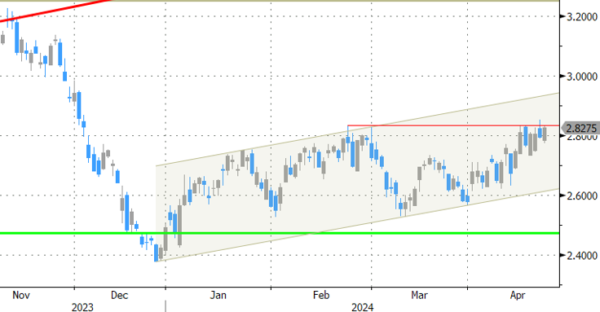
UK 2-y yield rebounds as BOE chief Economist Pill advocates caution on interest rate cuts as inflation risks persist.
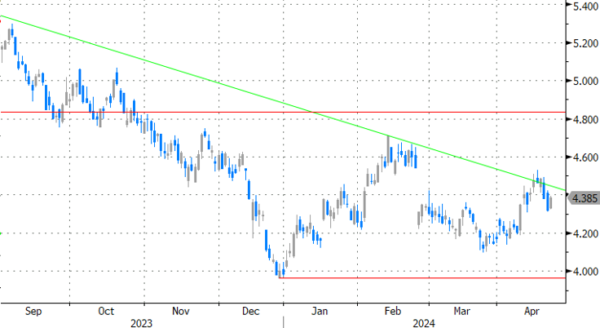
Forint holding stable near EUR/HUF 394 as MNB slows pace of rate cuts to 50 bps steps (7.75% from 8.25% today).
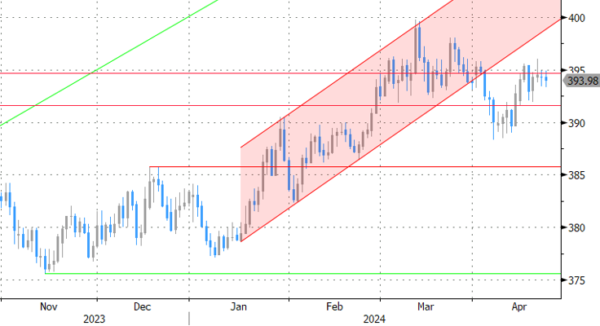
Gold correcting of top levels as geopolitical uncertainty eases
